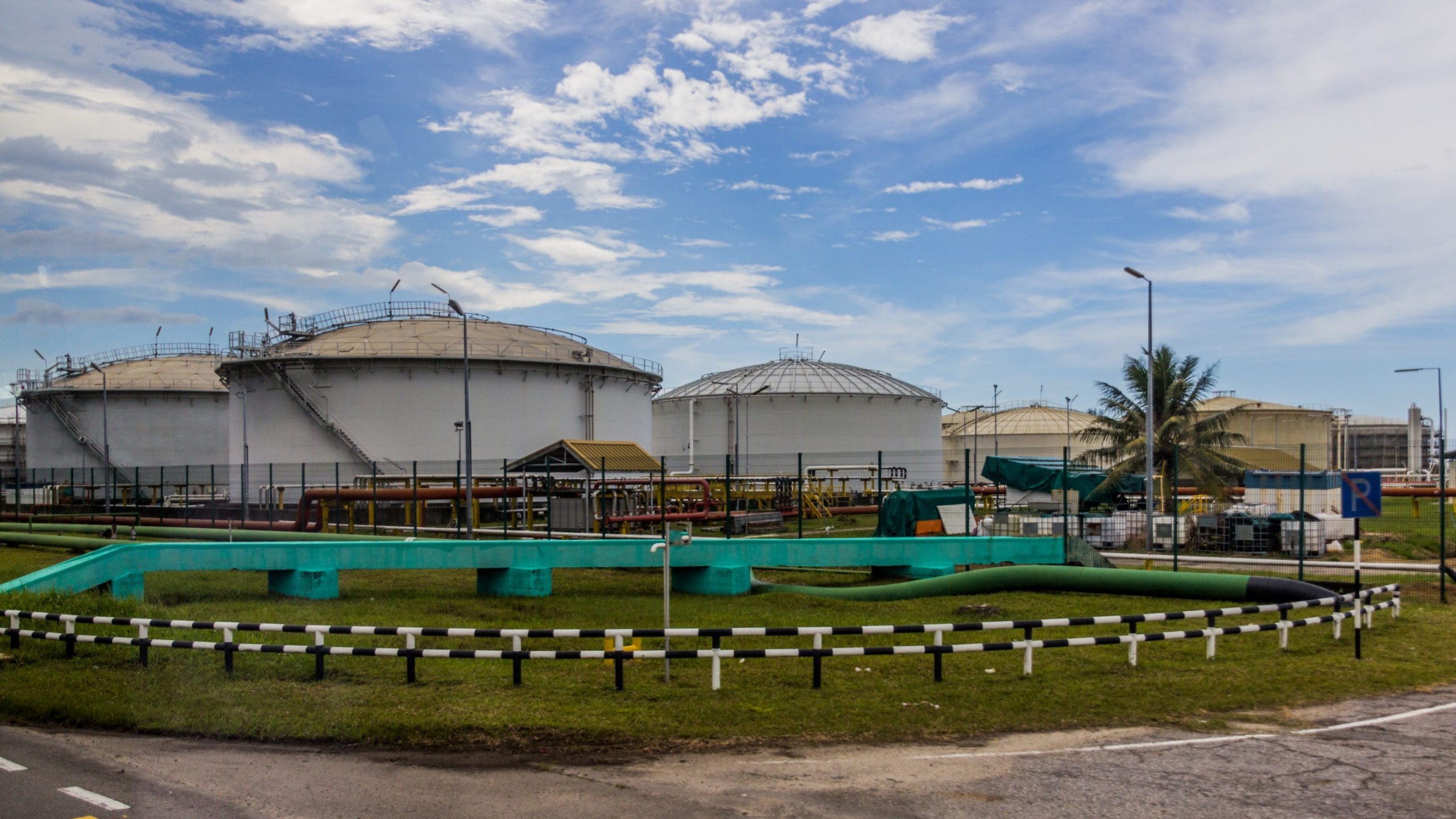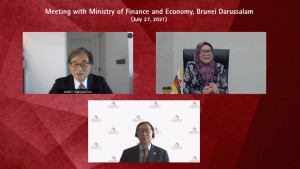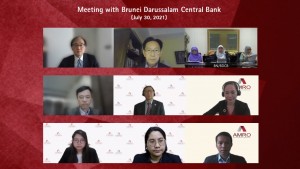
SINGAPORE, October 5, 2021 – Brunei Darussalam’s economy is expected to recover moderately in 2021, after slower but still positive growth last year amid the global economic downturn due to the COVID-19 pandemic. Supported by higher oil earnings, the country’s successful COVID-19 containment measures have allowed domestic restrictions to be lifted and contributed to a marked improvement in economic activity in 2021. These conclusions form the preliminary assessment by the ASEAN+3 Macroeconomic Research Office (AMRO), after its virtual Annual Consultation with Brunei Darussalam’s authorities from July 27 to August 5, 2021.
The mission was led by AMRO Lead Economist, Dr. Siu Fung (Matthew) Yiu, with AMRO Director, Mr. Toshinori Doi, and Chief Economist, Dr. Hoe Ee Khor, participating in the policy meetings. The discussions mainly focused on the impact of the COVID-19 pandemic on the economy, the progress of economic diversification in the country, and post-pandemic policy directions.
Recent developments and outlook
“Brunei Darussalam’s economy is expected to grow faster by 2.1 percent in 2021, benefiting from the easing of the pandemic containment measures and boosted by higher oil earnings,” says Dr. Yiu. “The improvement in economic activity is underpinned by the government’s effective containment measures, comprehensive economic support package as well as past diversification efforts.”
The economy grew at 1.1 percent in 2020, after expanding robustly by 3.9 percent in 2019. The slowdown was mainly due to the reduction in output of the oil and gas sector, reflecting the slump in global oil prices and demand, and more shutdowns of oil wells for maintenance.
The non-oil and gas sector, meanwhile, grew by 8.8 percent largely on the back of a surge in downstream activities, which offset the decline in public administration, transport, finance and education. On the demand side, major growth drivers for 2020 comprised net exports, chiefly from the Hengyi refinery, and private consumption.
The overall balance of payments registered a deficit of 3.7 percent of GDP in 2020, reflecting capital outflows in the financial account and a narrower current account surplus. As a result, gross international reserves declined to USD4.0 billion or 7.5 months of imports of goods and services in December 2020, down from USD4.3 billion in 2019. The country’s fiscal deficit is expected to narrow sharply in 2021 due to the recovery in oil and gas revenue on the back of a rebound in global oil prices and demand.
Risks and vulnerabilities
Major downside risks facing the economy continue to revolve around the oil and gas sector. The country’s high dependence on the sector makes it more susceptible to both domestic and external shocks. Domestic risks include disruptions in oil and gas production in mature fields, unexpected drop in output of rejuvenated fields, and uncertain commercial viability of new field exploration in a low oil price environment. On the external factors, weaker-than-expected prices and demand for oil globally will have negative implications on the economic outlook.
Despite some progress in economic diversification, the economy remains dominated by the oil and gas industry. Continuing diversification into other sectors would help minimize economic risks and improve the resilience of the economy.
Against the backdrop of the slow progress in vaccinations, a new wave of the pandemic, especially if it is domestic, could pose serious economic fallout, especially through lockdowns, travel restrictions, and supply chain disruptions. In particular, the containment measures would dampen domestic demand, raise the unemployment rate, and adversely affect micro, small and medium enterprises (MSMEs), which could lead to financial distress.
Policy recommendations
A faster and more effective vaccine rollout is highly recommended for achieving the government’s aim to inoculate at least 70 percent of the population by end-2021 and also to mitigate the risk of a new wave of infections, as happened in several neighboring countries.
The country’s fiscal deficit is expected to narrow sharply in 2021 due to the recovery in oil and gas revenue on the back of a rebound in global oil prices and demand. In view of the ongoing economic recovery, further short-term fiscal support, if needed, should be flexible and target households and businesses that are most affected by the pandemic, as well as enhancing public investments. In addition, efforts to reduce the high dependency on the oil and gas revenue should be further strengthened, while enhancing the spending efficiency.
Monetary conditions remain supportive of economic recovery amid low inflationary pressures. The government’s continued implementation of price administration measures has helped to stabilize inflation, especially to cushion impact of supply disruptions during the pandemic. However, in the longer-term, the government should allow prices to be determined by markets to avoid distortions.
Accommodative macroprudential policies should be continued to ensure sufficient financial resources to support the rebound of private sector activity. The temporary regulatory relief measures have allowed banks to support the private sector by deferring loan repayments thereby averting a deterioration in asset quality, ease financial constraints and sustain production. In the recovery period, the withdrawal of these measures should be gradual to avoid a cliff effect.
Further efforts to accelerate economic diversification through various structural reforms are essential for the country to strengthen its resilience against shocks and sustain robust long-term growth.
The economy should remain proactive in managing natural disaster risks through allocating necessary budget funds to enhance climate change mitigation and adaptation measures under sustainable development policies.
The AMRO team would like to convey its gratitude to the Brunei Darussalam authorities and other participating institutions for their cooperation and candid exchange of views. AMRO wishes to express its appreciation for the authorities’ strong support and excellent arrangements, which have led to the successful completion of this virtual mission.
[1] The Press Release is based on the virtual Annual Consultation Visit to Brunei Darussalam from July 27 to August 5, 2021. The recent resurgence of the local infections—starting from August 7—will be carried and analyzed in the upcoming Annual Consultation Report.

Top Row (from L to R): AMRO Director Toshinori Doi, MOFE Permanent Secretary YM Dayang Suraya binti Haji Jaidin
Bottom Row: AMRO Lead Economist Matthew Yiu

Top Row (from L to R): AMRO Director Toshinori Doi, AMRO Chief Economist Khor Hoe Ee, BDCB Deputy Managing Director Hajah Noorrafidah binti Sulaiman, BDCB Managing Director Hajah Rokiah binti Haji Badar, BDCB Executive Director Hajah Mahani binti Haji Mohsin
First Middle Row (from L to R): AMRO Deputy Director Wenxing Pan, AMRO Lead Economist Matthew Yiu, AMRO Research Data Analyst Madeleine Vinuya
Bottom Row (from L to R): AMRO Researcher Vanne Khut, AMRO Researcher Laura Grace Gabriella, AMRO Associate Yuthan Chea
